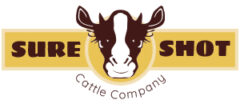WHY OWN A COW?
Miniature Jerseys vs. Standard Jerseys- How do I choose?
For people with smaller acreage or who are new to livestock, Miniature Jerseys may be a better option for you. The miniatures are half the weight of the standard-size Jerseys. Because of that, they can be easier to handle. The miniatures require less space, consume at least 50% less fee,d and produce much less manure. This adds up to saved time and money in the long term. Although the miniature’s initial purchase cost is greater, the savings over time in feed and bedding will quickly cover your initial outlay. A 700-pound cow will not consume or require nearly the resources that a 1200+ pound standard cow will require. Also, because the market is strong for small homestead cows, your produced offspring will command a much higher price.
People have many reasons for considering purchasing miniature cows. Here are some of the more common reasons:
1. Tax Status on Small Acreage
People often purchase small acreage homesteads on an “Agricultural” tax basis. To maintain that tax basis, owners are required to maintain agricultural animals on their land. Miniature cows are very efficient feed converters and can graze and maintain themselves on reasonable forage at the rate of 2 cows per acre. This also means a lower carbon footprint.
2. Family Milk Use
Miniature Jerseys normally produce between 1-3 gallons of high-component milk which is a perfect amount for home use. Often owners enjoy drinking fresh milk and making butter, cheese, whipped cream, sour cream, and ice cream. Families know exactly what their animals are eating and know the cows are not injected with hormones like BST which may have a negative effect on children’s development.
3. Health Benefits
I am not an expert on the benefits of raw milk. However, many of our clients choose to buy a cow to benefit from the attributes of raw milk. Many people with chronic health issues, especially those with autoimmune disorders, have found that raw milk has helped them reach remission. We recommend that our clients do their research to determine if they would benefit from drinking raw milk. One of our clients recommends this book, New Milk Diet As A Remedy for Treating Chronic Disease by Charles Samford Porter. This is an older book that can be purchased on eBay for $9-$30.
4. Efficient Feed Converters
Miniature cattle are known for being very efficient converters of feed. It has been said they are 25% more efficient than large-size cattle. Because of this fact, miniatures can bring meat and milk to the table for quite a bit less than regular-size cattle. A miniature steer can fill a freezer for a family without needing to find another family to “share” in the bounty.
5. Weed and Pasture Maintenance
Miniature cows do a great job of keeping the brush mowed down in your fields. This can save a small acreage property owner quite a bit of time and help them make money at the same time.
Here are our Percentage Lowline Angus cows. The larger white cow is a mid-size British White.

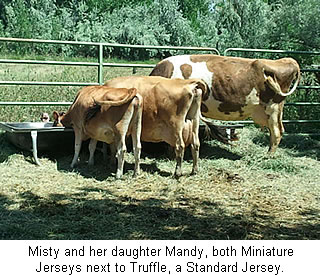
6. Less Intimidating Size
Miniature Jerseys have lovely personalities. Mine have made great pets. I have plenty of standard-size Jerseys to compare them with and the minis always seem to be very sweet and easy to handle. They seem to really enjoy being with people and their small size makes them less intimidating to most people.
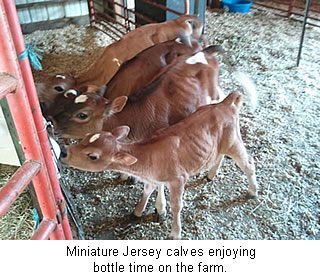
7. Home School Projects
It is easy to incorporate a Miniature Jersey into a home-school family. The children can share in the daily care of the cow, keep detailed profit and loss records, learn to manage a checkbook, keep track of inventory sheets, and budget for feed. A small CSA milk share business can allow the cow to be self-supporting and show young people that it can be rewarding to be successful in their endeavors.
Miniature Jersey calves enjoying bottle time on the farm.
8. Self Sustainability
Many people are becoming more interested in self-sustainability. A family on a small acreage can easily care for a vegetable garden, a few chickens, and a family milk cow. This allows for most produce, dairy products and meat to be produced at home at a fraction of the cost of purchasing these items at the store. Additionally, these families have the added peace of mind of knowing exactly what goes into their food supply.
9. Pets
Some people want a few farm animals for pets. We often have steer calves for sale that make excellent pets. They are sweet, cuddly, and quite a novelty. They stay small and are a lot of fun.
When is a Standard or Modern Size Jersey a better option?
If you are accustomed to handling livestock, have larger property, have limited immediate funds, or really need large quantities of milk, the more modern, Standard Jersey may be a good option for you. Many of the Standard size Jerseys are easy to handle and under ideal conditions, can milk up to 12 gallons of milk per day. They tend to be less expensive for your initial purchase price and if properly handled can be delightful family cows.
Miniature vs. Standard
Why is a Miniature cheaper than a Standard-Size cow?
Feed Cost
If you keep a Standard Size Jersey in a corral next to a Miniature Jersey Cow and feed them every day for a year, you will pay about $2500 more in feed for the Standard Size cow.
Calf Value
Standard-size heifers will sell for only a fraction of what your Miniature Jersey calf will sell for.
Body Condition
Very few Standard-size cows can maintain their body weight while milking when fed regular hay and grain. Normally they can only be milked for around 5 months before they are so skinny that you have to dry off their milk because their body condition is so poor. Because they are so thin, it is almost impossible to get them to re-breed. It can take 4-5 months to put the weight back on to allow for a pregnancy to occur. Then you have 10 months to wait for your cow to milk again. Can you afford to own a cow that can only milk for 5 months and have a 15-month dry period before milk flows again? Most of us can’t! Imagine what happens if you have a very thin cow and it gets sick. How long do you think you have before you are in an emergency? More often than not, the body’s condition is so poor that without emergency intervention the animal will not survive. Immunity decreases with poor body condition.
Miniatures thrive on hay and grain. They are fat and sassy while milking. Most can maintain their weight for the 10-month milking period. They breed back easier due to higher body condition. They have enough fat reserves to be treated at home by a vet if they ever get sick.
Smaller Property Size
Smaller properties are ideal for the Miniature cow. Standard cows need more space.
I have personally owned many Standard-size Jersey cows. I have decided to only focus on Miniature and Mid-Mini Jersey cows because of the above reasons. We have many more customers than available cows. This is what is working well for our clients and for ourselves. Someday I will put the pencil on the paper for you. It is amazing how quickly the Standard-size cow becomes much more expensive to own than the Miniature Jersey.
Milking a Miniature Jersey
Thoughts in milking techniques, details, etc…
Lately, I have had a lot of people calling me with questions about milking Miniature Jerseys. There have been some false statements made by larger cow owners about Miniature Jerseys being difficult to milk. I am going to set the record straight. I own and milk over 20 Miniature Jersey cows per year. I have milked more Standard-size Jerseys than I can count. I suppose I have as much or more experience in this area than anyone else and feel qualified to give some accurate information.
Height. Does it make a difference?
Standard-Size: These days standard Jersey cows are so tall that it is harder to aim the milk in the bucket. The size of the teats has been selectively bred to accommodate modern milking machines. They are normally about 2 inches long. This is a little short for most beginning hand milkers. For those of us who have had more experience, it does not make much difference. The regular, standard Milking Machine with claw works great with no issues.
Mid-Size: These cows are very easy to milk. There is plenty of clearance for the bucket and it is easy to aim into the bucket. The cows tend to have the same size teats as standard cows. The regular, standard Milking Machine with claw works great with no issues.
Mini: Miniature cows who are 39-42 inches in height are not much different to milk. They actually on average have the same size teats as the Standard and Midsize cows. Usually on the taller range of Mini, there is clearance for your bucket. Truthfully, some of the smaller-sized cows can be harder to milk for taller people. A friend of mine came up with a very simple way to make the Mini a little “taller” for milking. All you need to do is put a block of wood under her hind feet and teach her to stand on it. Having an extra 6 inches or so for the 10 minutes you milk makes it just like milking a Mid-size cow. The regular, standard Milking Machine with claw works great. No issues. I milk 5-10 Miniature cows twice a day. I do not have ANY problems with getting them milked by hand or machine. My machine works so well that I put it on, leave the barn for 5 minutes, and return to remove it and move on to the next cow. If anyone tells you that you need a “special size machine” for Miniatures is not being truthful. Likely, the real problem is they have mechanical problems with their machine.
What about Teat Size?
For most beginner milkers, approximately 3-inch long teats can be easier to milk. Once you get the hang of it, you can milk smaller teats just as easily. Obviously, on occasion, there might be a cow with “really tiny” teats. On the other hand, occasionally you find one with “huge” teats. Most cows that are mini in size have the same size teats as larger cows.
Large Teats are NOT desirable and are considered a conformation fault!
Why? The reality of the situation is that large-size teats often get injured. Often they step on them when they are trying to stand up. Other cows accidentally step on them as well. In very cold weather, large teats can get frostbite. Sometimes this is so bad they fall off. Large-size teats will NOT fit in a regular, standard Milking Machine. The larger teats make milking by hand harder as well. Medium-size teats are the breed standard and are what most of our Miniature Jerseys are producing.
What matters more than teat size when milking?
The hole the milk comes out of is called an orifice. Some cows have smaller orifices than others. It is easy to milk a cow with big orifices. The milk pours out with little effort. If the holes are too big, the milk will leak out regularly which is not a good thing. Teats that leak regularly all day (not just at milking time) are more prone to mastitis. Cows with tiny orifices are incredibly difficult to milk by hand. Those cows are much better for machine milking. The hardest cows to milk have large teats and small orifices.
Milking by Machine
Milking by machine is wonderful. The milk is ultra clean which is very desirable. If you have a machine that has mechanical problems, you will have issues with milking. The most common problem is vacuum loss. Vacuum loss can be caused by the wrong replacement parts, holes in your rubber inflations, the wrong lid seal, and water or ice in your lines. A properly working machine has enough suction to latch right onto the teat. It hangs with some clearance off the ground. If your machine is not working properly, you will have issues getting the machine to stay on the teats. This is not a “teat size” problem. This is caused by the lack of a vacuum.
Should you use a Milking Machine?
It is my firm belief that anyone considering selling milk shares or who might consider drinking raw milk should be milking by machine. It is costly to purchase a machine. However, the difference between machine-milked and hand-milked is amazing. Milk that is produced by hand milking is filthy. It is full of hair, dirt, and manure. Milk that is milked by the machine is very clean. We must remember that we are no longer milking on our grandparent’s farms. Back in the day, they did not have to worry about superbugs like MRSA. Today’s bacteria are tough and antibiotic-resistant. The cleaner the milk we bring to the table, the safer it is for our families. Consider purchasing a machine and learning to properly milk your cow and clean your machine. Lastly, remember to milk test your cow on occasion to ensure you continue to provide a quality product for your family.
Purchase Information
What to know before you make a purchase.
My goal is to help the buyer find a suitable animal that will fit his/her experience level to hopefully allow for a positive experience. All sold animals will be sold with a written contract signed by Seller and Buyer outlining the following information.
Beginner Livestock and All Cattle Purchasers Take Note of This:
Normally I try to match up people who are new to livestock or cows with an older animal that is specifically chosen for its docile temperament and ease of milking. These animals typically are not show animals and may not have perfect conformation. However, the goal here is to provide a positive, safe learning experience for the buyer. Often new livestock owners get caught up in the “cute” factor so I try to be very honest about the animal being sold and what the new owner should expect. Often people’s needs and desires change over time. Please try to remember that if your first goal is to purchase a safe, gentle cow to learn with, that is what we will help you find. However, if your goals change, you may need to purchase a different animal to meet the new expectations.
Contract Particulars:
Buyers are encouraged to come to our farm and meet the animals being considered before making a purchase. Buyers are welcome to have a veterinary pre-purchase exam on the animal they intend to buy. All milking stock has been tested negative for BVD-PI, BLV, and Johnes before entry to our facility. All adult animals are sold with current test results for BVD-PI, BLV, and Johnes. Baby calves are sold with negative results for BVD-PI as they are too young to be tested for BLV and Johnes. Baby calves’ parents are negative-tested animals. Cows are tested negative for contagious milk bacteria immediately before leaving our facility. All livestock sold as bred have been blood tested “pregnant” immediately before leaving our farm. These results will be provided to the buyer as a courtesy. Sure Shot, LLC assumes no responsibility for lost pregnancies (including re-absorption, miscarriage, pregnancy problems, calf or cow death, or birthing problems). Adult bulls are sold with a current fertility test as well as extensive disease testing. Bulls are usually sold following semen collection and may need to be transported from the collection facility. Adult bull and baby bull fertility is not expressed or implied and is not warranted. Adult bulls are sold as “live cover only” breeding rights. Buyers may use the bull live cover as much as they like but may not sell frozen semen unless written permission is obtained from the Seller. When the Buyer sells the bull to a new owner, frozen semen rights are still retained by Sure Shot, LLC unless written permission to release semen rights is obtained from Sure Shot, LLC. Frozen semen rights are retained in perpetuity by Sure Shot, LLC on all adult bulls that have been previously collected by Sure Shot, LLC. The seller has the continued right to market and sell all frozen semen retained in Sure Shot, LLC inventory. It is up to the buyer to re-test the animals for any disease if desired. I will never knowingly sell any sick or injured livestock without disclosure. All animals are sold “As is, where is. No warranty expressed or implied. All sales are final”. All expenses incurred by Sure Shot, LLC on behalf of the buyer will be billed directly to the buyer and are the sole responsibility of the buyer. I will be happy to board the animal for a mutually agreed-upon period before pick up. Once livestock is sold, all health-related issues or veterinary problems become the sole responsibility of the buyer.
Out-of-State Buyers
Each state has different import rules for cattle. It is the buyer’s responsibility to call their State Veterinary Office and find out what is required for entry into their state. Most of our animals do have a legible “Bangs” tattoo/tag (OCV for Brucellosis) in their ear. Most states will require new blood testing and a veterinary Certificate of Health to be issued for each traveling animal. The buyer is responsible for this cost. The seller will work with a licensed veterinarian to complete the testing and paperwork required for out-of-state sales.
Reserve an Animal
If you would like to purchase an animal you must pay for it in full. At the time of payment, individual situations will be discussed and an agreement will be reached for the date of pick-up.
Brand Inspection
A Brand Inspection Certificate will be provided for each animal purchased by the buyer. This will constitute the buyers official Bill of Sale for the State of Colorado. Seller will cover this cost.
Insurance
Mortality insurance is available and the buyer is encouraged to purchase a 1-year policy to cover the purchased animal. The policies typically cost 10% of the purchase price of the animal and will reimburse the buyer for the purchase price of the animal in the event of the death of the animal. Mortality insurance may be purchased from various insurance agencies that are available nationwide. It is up to the Buyer to choose the agency want to work with. Buyers are responsible for any payment due to the insurance companies for the policy purchased.
Returns
No Returns, No Exceptions.
Transport
Transport is the responsibility of the buyer. Due to changes in environment, feed, stress, handling and care, Sure Shot, LLC can not predict the behavior of or health of the animals once they leave our facility.
Abandonment
If the animal can not be picked up within 30 days of the agreed-upon date, it is the buyer’s responsibility to make alternate arrangements in writing with the seller. If the buyer does not make alternate arrangements, the animal will be considered abandoned and the seller will re-list the animal for sale. The purchase price will not be refundable in the event of abandoned livestock.
Registered Animals
A copy of the registration certificate is available when applicable and provided to the buyer at time of purchase. Any pending paperwork will be forwarded to the buyer by the seller when it is received.
Please refer to the list below of products we use regularly.
Products We Recommend
Please refer to the list below of products we use regularly.
Delaval Bucket Milker (you also need the pump below to make the bucket work)
We order our Milking Buckets from Parts Department Online. This company has good customer service and this machine is easy to use. It has standard rebuild parts for the pulsator which are available from many companies. Additionally, you can order your replacement rubber parts from this same company. This will make things very easy when you go to reorder new inflations and rubber gaskets. This is a full-service company so if you need bucket washing detergent, cleaning brushes, stainless pails, etc. you can order them here with a simple phone call. These are NEW units. Not refurbished, not used, not junk that will break in a month. There are other units you can buy BUT those units can hurt your cow if you are not an experienced user. The DeLaval type unit is 100% beginner friendly and your cow will thank you for buying this one over another. www.partsdeptonline.com 800-245-8222 They can take your order over the phone or online and mail the unit directly to you. We do not like the Vacuum Pump sold by his company. We prefer the Conde Vacuum Pump below since it is MUCH quieter.
Conde Vacuum Pump
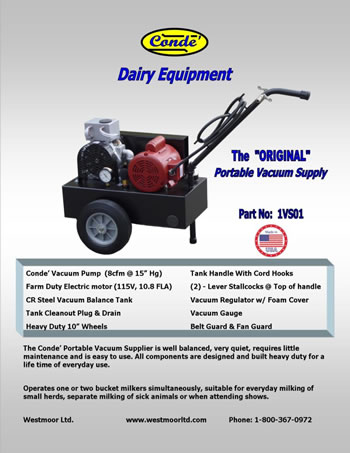
The Conde Vacuum Supply is the original portable milking vacuum supplier for bucket milking up to two cows at once. We use this pump every day to milk up to 10 cows on a twice-a-day schedule. It is oil-cooled and it has a vacuum tank. This pump came with a 3-year warranty and it is a workhorse. Our clients have tried to save money and purchased other pumps from other companies. Those same clients have had lots of issues and problems with those different machines. Besides, when you have a problem with this machine, this company can direct you over the phone on how to correct the issue. They build them on-site. This is a company direct with no middlemen. Westmoor LTD is a very professional company and we hope you like working with them as much as we do. Their phone number is 800-367-0972.
Portable Vacuum Supply, Part No. 1VS01
Milking Stanchion
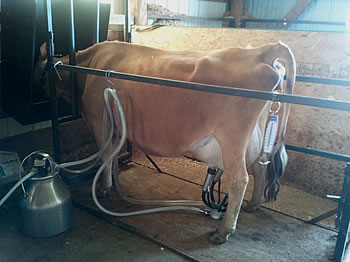
We have found the easiest thing to use for a milking stanchion is a blocking chute. These chutes are usually portable and fold up when not in use. they are easy to move for cleaning and can double for a cattle chute for light veterinary use. If you need to give your milk cow a shot or look at her foot, you can probably get it done in this little unit. These can be found used at farm sales or on eCommerce sites such as Craig’s List (under farm and garden) or Facebook Marketplace. They can be found new in cattle show catalogs such as eNasco Farm and Ranch or Sullivan’s Supply.
Milk Replacer
We like 24/20 ALL Milk Replacer. It is specifically made to meet the requirement of Jersey calves. These days, formulas are made from all kinds of things that are not “all Milk”. The formulas made of Soy or Blood Plasma or Wheat are NOT adequate to meet the needs of Jersey calves. Please do your research.
Nipples

We like the Merrick Super Calf nipple. These nipples have the perfect size holes for baby calves and you never need to make adjustments. As the calf ages, the nipple hole becomes larger. We have tried every nipple out there. These are the best by far and worth a special order. This nipple can be ordered from Nasco.
Product number C25056N.
Bottles

Advance EZ Nurse Bottle-3 Quart. This bottle is great because as the calves get older, the hold the additional milk older calves need. This bottle can be obtained at Nasco.
Product Number C25544N.
Bottle Holder
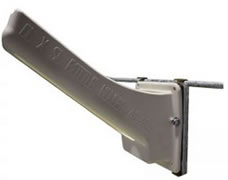
These are the bottle holders we use. They are easily bolted to a wire calf panel. They can be also be screwed to a wood frame. These holders are tough, hold the bottle securely and train the calves not to butt the bottle. They retail about $25 and are made by Agri-Plastic, Inc. They can be purchased from IBA Dairy Depot located in Evans, Colorado. (970) 284-6599.
Shampoo
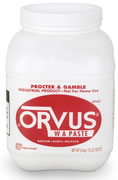
Orvus. This is the only shampoo you will ever need. It is AWESOME. I use it on all my animals. It is gentle, removes manure like nothing else and one gallon will last you forever. This product can be obtained at Nasco.
Product number C01036N.
Hamilton Nylon Cow Halter
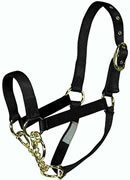
These halters have quilted stitching for durable construction and the highest quality durable nylon webbing. They are available in several styles and colors.
More information is available on the Hamilton website and at Amazon.com.
Calf Jackets
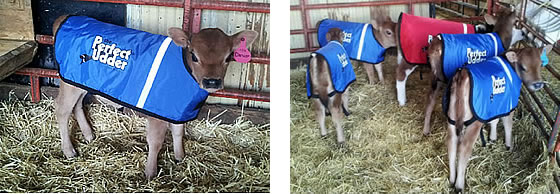
We love these calf jackets. They are very adjustable and fit the Miniature Jersey calves very well. They are sturdy and hold up well. They are very affordable as well costing under $50 each. Calf jackets normally come in two sizes. The size small will normally fit until the calf is about 2 months of age. The next size is generally marketed as Large and should fit until the calf is 4-6 months old. They can be found at a variety of companies. Unfortunately, the company that made the above-shown jackets is no longer selling them.
Electrolytes
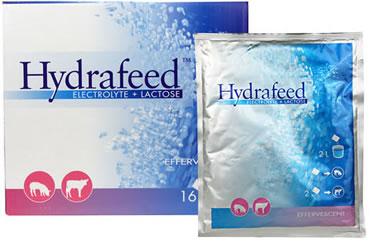
We love this brand of electrolyte. It has added lactose to supply all the energy needs a calf needs in place of a milk bottle. When your calf gets diarrhea you need to provide them with an electrolyte to keep them up and going. This is given instead of milk and the calves love the flavor. Our babies usually love this so much that they will drink it from the bottle and don’t need to be tubed as often. Not very expensive at around $4 per pack but WELL worth the money spent.
This can be purchased from PBS Animal Health.
Veterinarian
Yes, you need one. You need to have one you have established a relationship with before having some sort of emergency. Make sure your veterinarian understands you love your cow and want to provide excellent care for her. Find out ahead of time what it costs for a farm call. Create a savings account with adequate funds in case an emergency involving your animal occurs. Find out if the veterinarian has a “well cow” package you can buy for fall and spring shots. Discounts may be available if you pay for the package ahead of time. Often veterinarians will respect you more if you call them out for routine things in addition to emergencies. A vet who provides routine care will often make the additional effort to come to the farm in emergencies when they know you are serious about providing year-round care for your animal. Generally, veterinarians don’t make emergency calls for people who are not an established client. If you do not have a veterinarian and you have an emergency, be prepared to have to load and drive the animal to an emergency Large Animal Hospital. Keep in mind that sick cattle may not be willing or able to be loaded in a trailer during that emergency. Additionally, remember that this means you have to already own a truck that you know how to hitch to the trailer you already own. You need to know how to drive with care and concern when livestock are being hauled in the trailer. Stop too fast and your animal will be thrown into the front wall of the trailer and you may hit the vehicle in front of you due to the longer stopping times trailers require. Accelerate too fast and your animal will hit the back gate of the trailer, possibly break the back latches, and end up on the road. Animals are very delicate and are easily injured in trailers so you need to be aware of this. You will need to have trained the animal to load into the trailer and practiced doing this. The stress of having an emergency will make hooking up the trailer, backing it up to the corral, loading the animal (if even possible), and driving it to the hospital harder more difficult than you imagine. Before calving, call your vet and have a plan of action in case you do not have a routine delivery. Let your vet know you would rather provide your cow with a C-section than lose the cow and/or calf. Find out what that would cost. If it is not in your budget, ask your vet if he can discount the service in the unlikely event you need it. Often vets can be flexible in their pricing when facing owners who are “prior planners”. Shop around. You need a vet with a lot of cattle experience. Make sure your vet understands your goals with your cow. Plan for what you will do in an emergency. Remember, if you think your cow is not well, it probably is sicker than you know. Animals hide their illness. You need a vet to be willing to come out when you call. Same day. And if they come, you need to appreciate them for doing it. Many veterinarians are choosing to not have after-hours services. Have your vet give you a referral number for those times when they can’t be reached. Our vet gave us an alternate veterinarian’s number in the event we couldn’t reach him. Our vet has already arranged with the alternate vet to accept our calls. Remember, most veterinarians go to vet school because they love animals and have a keen interest in keeping them healthy. They will appreciate clients who feel the same way. We use Dr. John Flinchum in Longmont, CO. He can be reached at (303) 702-1755.
Hoof Trimmer
You need to find one in your area. You can call purebred cattle breeders or 4-H clubs to get referrals.
Insurance
We recommend purchasing a Cattle Mortality Insurance Policy on all the animals we sell. It is comforting to know that for a few hundred a year, your animal investment is insured for the purchase price in the unlikely event of catastrophic loss. There are various companies located all over the nation that sell them. You will need to do a Google search for “Cattle Mortality Insurance” to find a company to purchase the policy from.
